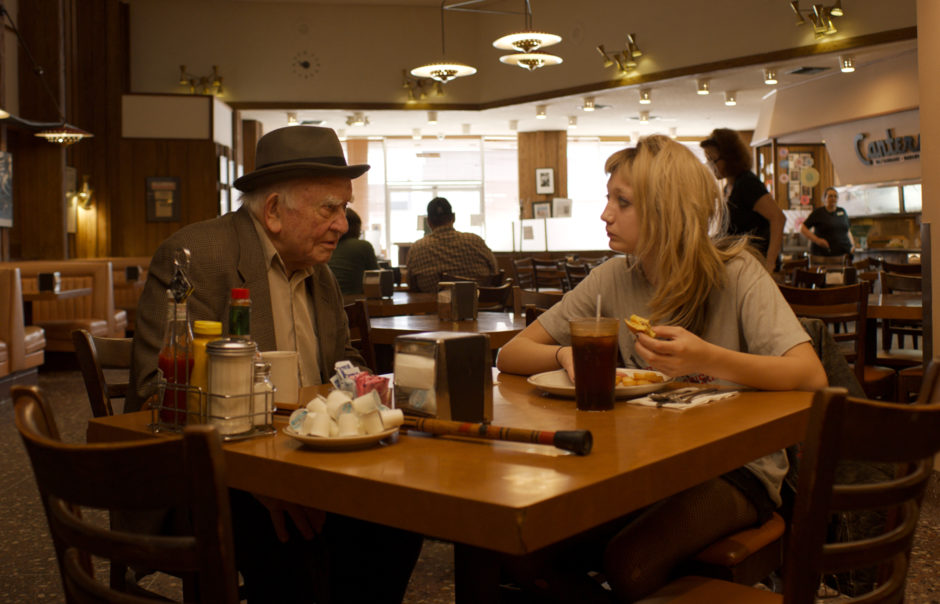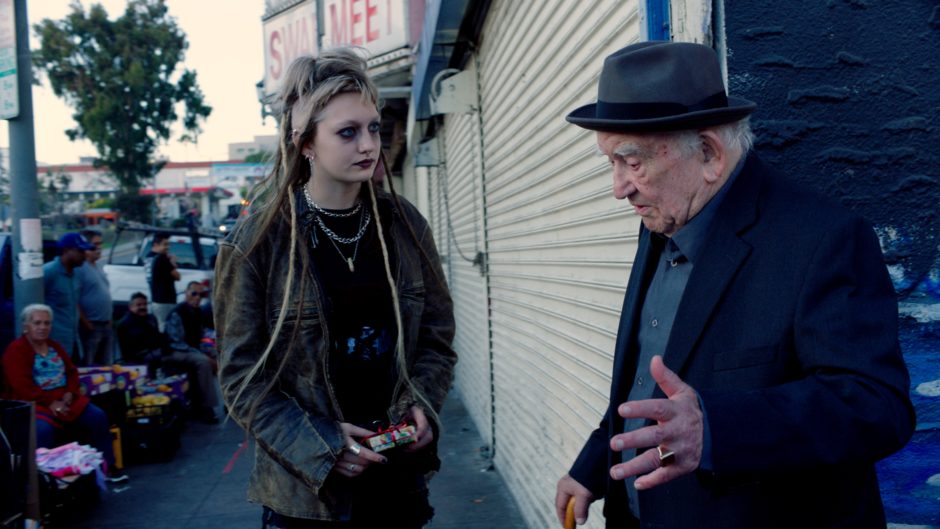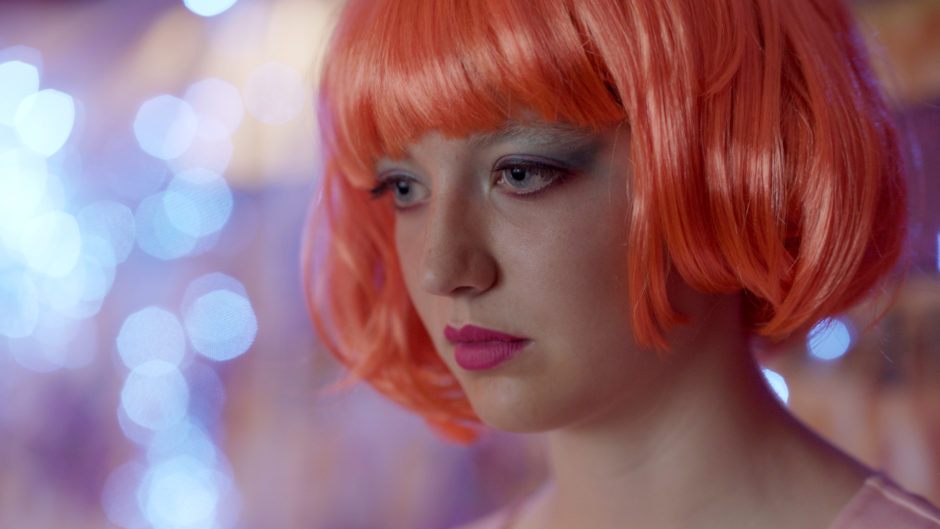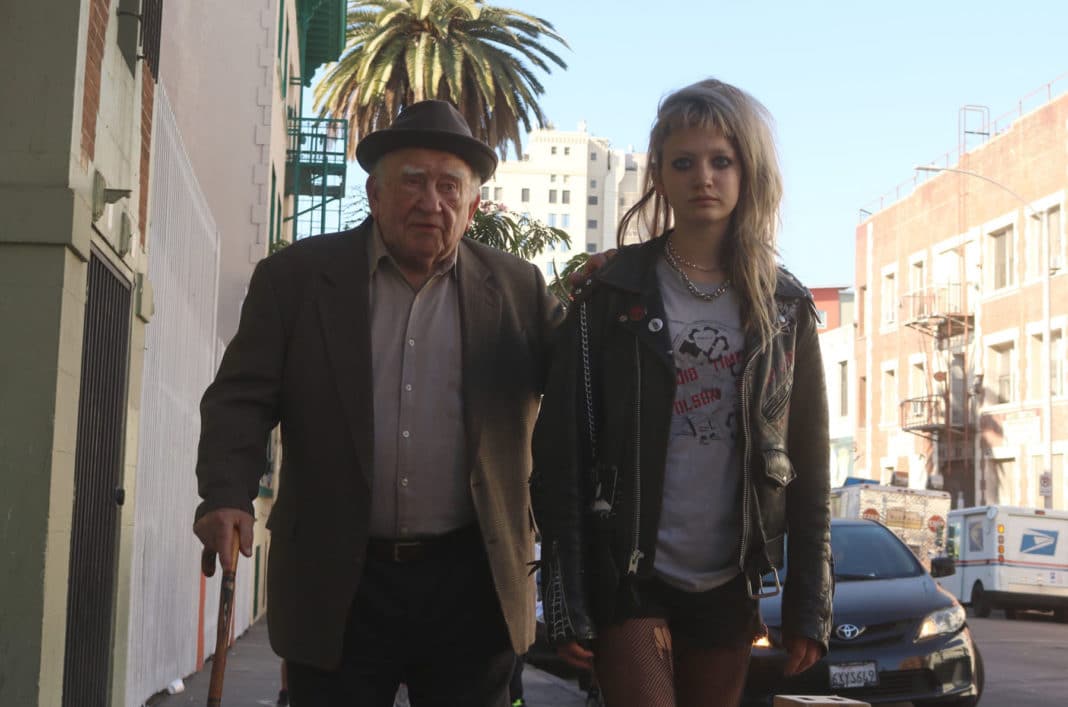“I wondered, if I survived the Holocaust, could I forgive,” Wendkos, who wrote the 2000 film “Coyote Ugly,” told the Journal. “If a man suffered, what would it be like afterward? I would hear people say ‘what’s the big deal with the Holocaust? People in wars die all the time.’ No this was a different horror. So, I created an imagined character.”
He was Samuel (Ed Asner), an elderly Holocaust survivor. While visiting his wife’s grave, he sees a teenage girl who appears upset and homeless.
She is Casey, who has a swastika on her jacket and claims that six million Jews were not killed in the Holocaust. Even though she is pretty, she’s convinced she’s ugly. Hermother appears to care more about her new boyfriend than her daughter, while her father has a new family. She works as a prostitute, and doesn’t want to be anybody’s charity case,
Samuel invites her to stay at his Los Angeles apartment. He has two conditions: She must take the swastika off her jacket and she must go to school. She agrees.
“God presented me with a challenge,” he tells her. “If I could learn to forgive you, a child in a swastika, then perhaps I could learn to forgive all before I die.”
He doesn’t judge her, though he advises her against the illegal way she makes money. It turns into a grandfather/granddaughter relationship.
Shocked at why is helping her, Samuel explains that he didn’t get to teach his own daughters to be ladies; theywere twins who died in the Holocaust.
He encourages her to reach out to her family. The film gets its title from Samuel explaining that one must embrace fear and bring the tiger inside.
Asner, an Emmy and Golden Globe winning Jewish actor, is tough and gruff but kind. Margot Josefsohn gives a breakthrough performance as Casey, and she nails the role of an angsty teen who fears she may not find love, acceptance or a purpose. Her talent is undeniable and when she cries or when she screams it is impossible not to feel her pain. Casey’s ranting stems not from hate but from ignorance. But she’s a quick study when she has the right teacher and appreciates a person who gives her a chance when others have given up on her.
Director Rafal Zielinski said he and Wendkos had been trying to make this film for 20 years and, over the years, had approached actors such as Natalie Portman, Kirsten Stewart and Martin Landau. He was giving a ride to a friend who happened to be working with Asner, who called up the actor and put the director on the phone. Zielinski pitched the film to him and Asner told him to drop the script off by the doorstep. He did and Asner accepted the role.
“It was a kind of a miracle,” Zielinski said.
Finding the young actress was tough. He said he saw Josefsohn, then a 14-year-old who had never acted in a film, at an audition for a commercial.
“I saw her, and she hadn’t really acted before, but I noticed she had deep expressive eyes,” Zielinski said. “She was magnetic.”
The casting director wanted an 18-year-old to play a 14-year-old. Zielinski and Weendkos disagreed and knew Josefsohn would be perfect for the role.
Wendkos said she is happy the movie got made.
“There were a number of times I thought it wouldn’t happen,” Wendos said. “Everyone that saw the script loved it, but they said with an older character and a young girl, they can’t open a movie.”
The film was delayed due to the pandemic. Both said the film is especially poignant now.
“My mother really wanted this film to get made,” said Zielinski, who is from Warsaw. “She is, what you might say, a partial survivor. She was Jewish in Białystok, Poland. Her husband wasn’t Jewish. Somehow, they slipped through the cracks, and whenever the Nazis came, they would hide her in the cellars. My mother told me they would drive in one direction and Nazis took Jews away in another direction. It was terrifying and sad. She suffered a lot.”
Zielinski said she died a few months ago. Asner died in Tarzana, in 2021.
A scene where a group of skinheads vandalize a synagogue was shot in Westwood.
“I had no idea when I wrote the script what kinds of things would happen,” Wendkos said, “how antisemitism would be happening, and people would deny the Holocaust or not know about it. When I was young, I was the dumbest one, but now, I’m the smartest. It’s like everybody else took a dumb pill.”
She noted that her ex-husband told her she was the first Jew he ever met and when they were getting divorced, her ex-mother-in-law said he should “take the Jew for all she’s worth.”
She said Asner approved Josefsohn and “the camaraderie they had in real life mimicked the warmth of the movie. He watched out for her.”
She said Asner, who was used to air-conditioned trailers, didn’t complain much because he cared about the mission of the movie, but she gave him popcorn when he was cranky.
Josefsohn, who is now 20, said she researched skinheads and the Holocaust for the role.
“I was nervous seeing the older girls at the audition,” Josefsohn told the Journal. “I’d done modeling but hadn’t acted in a film and once I learned who Ed was, I was a little intimidated because I didn’t know what to expect.”
The Santa Barbara resident said it felt very natural to act with Asner, who was kind to her.
“I think the message of the film is it’s important to let people feel the need to love and be loved,” she said.
In the movie, Casey is courted by her classmate Tony, played by Diego Josef, a cool handsome boy, who before their date tells a protective Samuel that he doesn’t have to worry … “this time.”
Casey gains confidence when Samuel buys her a beautiful dress and Samuel sees her as part of the family that was ripped away from him.
Zielenski said he interviewed a number of people about the nature of forgiveness in Los Angeles and New York City prior to making the film. He said it was an honor to direct Asner in his final film.
“He was such treasure to work with,” he said. “He was very proud of this.”
Wendkos said she does not regret casting an unknown or sticking to the vision of her script.
“She was so good we were flabbergasted,” she said of Josefsohn. “This script was something I cared a lot about and the message was important.
Asked if she plans to do more feature films, Josefsohn said it was possible and she will examine what comes next.
“Tiger Within” is a simple yet piercing film that reminds us that drowning people who say hateful things may change their tune when the tide has turned and they are safely on land. There is the realization that life can be a nightmare or a fairy tale, but most often is something in-between.
As for Zielinski, he had not expected things to change so much in the last few years.
“We are living in a very disturbing and dark time where there is misinformation and people can be easily influenced to believe incorrect things,” he said. “For this reason, this is a film I hope young people see. I hope we can turn one stone, and then another and another.”
“Tiger Within” is available to rent on ChaiFlicks, Amazon Prime and other streaming video on demand services. It is playing in select theatres including The Laemmle Town Center in Encino.






